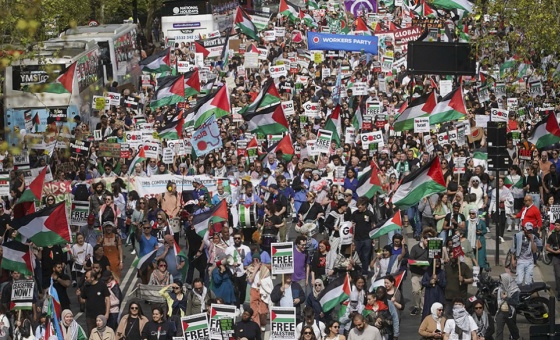This is the last article you can read this month
You can read more article this month
You can read more articles this month
Sorry your limit is up for this month
Reset on:
Please help support the Morning Star by subscribing here
“Poetry can stick up for the weak,” says Michael Rosen, or it can “mock the mighty. It can “glorify our rulers or it can dissect them. You choose.”
In Listening to a Pogrom on the Radio (Smokestack Books, £8.95), his new collection for grown-ups, Rosen makes his own choices clear. It’s a book about anti-semitism, racism, Trump, Le Pen and the Tory assaults on the NHS and education — the stupid and the sinister, the ridiculous and the revolting:
“I was listening to a pogrom on the radio today / coming from a party conference where they had a lot to say / about people who move, people who move here / and I got it from the pogrom this is something to fear / I should worry about the people next door / I should worry about the woman cleaning the floor...”
Few poets writing today can move so effortlessly between the voice of seriousness and the voice of the child who asks why the emperor is not wearing any clothes, as in Le Front National.
“Child of Vichy / the last time you were the government / you gave my great-uncle and aunt’s address / to the Nazis. / That was how the Nazis found them and deported them / to Auschwitz, from where they never came back. / What are your plans this time?”
Against barbarity, the Palestinian poet Mahmoud Darwish once said, “poetry can resist only by cultivating an attachment to human fragility, like a blade of grass growing on a wall as armies march by.”
That's certainly the case with A Blade of Grass: New Palestinian Poetry (Smokestack Books, £9.99).
Edited by Naomi Foyle, poet, novelist and one of the co-founders of British Writers in Support of Palestine, it brings together new work by poets from the Occupied West Bank and Gaza, from the Palestinian diaspora and from within the disputed borders of Israel.
Included are Mahmoud Darwish, Maya Abu Al-Hayyat, Deema K Shehabi, Ashraf Fayadh, Mustafa Abu Sneineh, Naomi Shihab Nye, Marwan Makhoul, Farid Bitar, Fatena Al Ghorra, Dareen Tatour and Sara Saleh.
It’s a bilingual anthology — the English starts at the “front” of the book, the Arabic at the “back” and they meet in the middle — and it celebrates the flourishing cultural resistance of the Palestinian people to decades of displacement, occupation, exile and bombardment.
A percentage of the receipts from the book will be donated to support the legal fees of two of the poets in the anthology, Dareen Tatour and Ashraf Fayadh, currently imprisoned in Israel and Saudi Arabia because of poems they have written:
“I am accused of words, / my pen the instrument. / Ink – blood of the heart – bears witness/and reads the charges. / Listen, my destiny, my life, / to what the judge said: / A poem stands accused,/my poem morphs into a crime. / In the land of freedom, / the artist’s fate is prison.’
And this is Fady Joudah.
“My daughter / wouldn’t hurt a spider / That had nested/Between her bicycle handles / For two weeks / She waited/Until it left of its own accord // If you tear down the web I said / It will simply know / This isn’t a place to call home / And you’d get to go biking / She said / that’s how others / Become refugees isn’t it?”
Mustafa Abu Sneineh’s take on the fable of the ant and the soldier is as pertinent.
“My story is there when the story of war is told / Since no-one pays attention to a plucky ant except /when a defeated / Conqueror notices her. / The conqueror can stare all he likes. / One day someone will come and tell the story I recognise: / A brave ant contemplating a defeated conqueror.”









